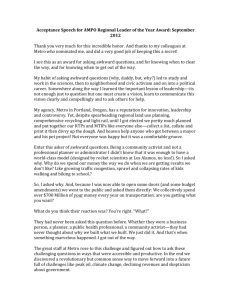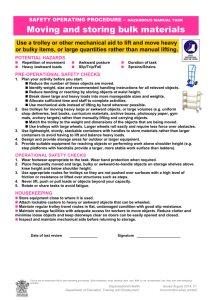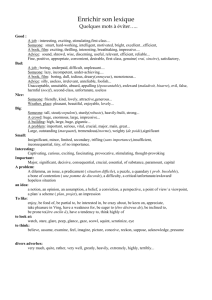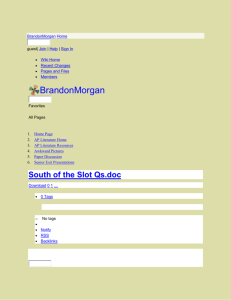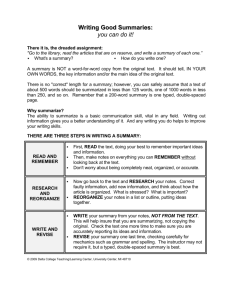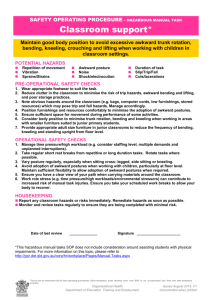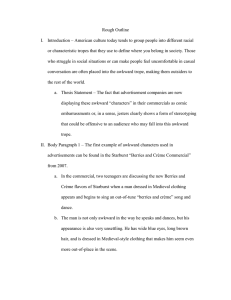Quik Lube Oil
advertisement
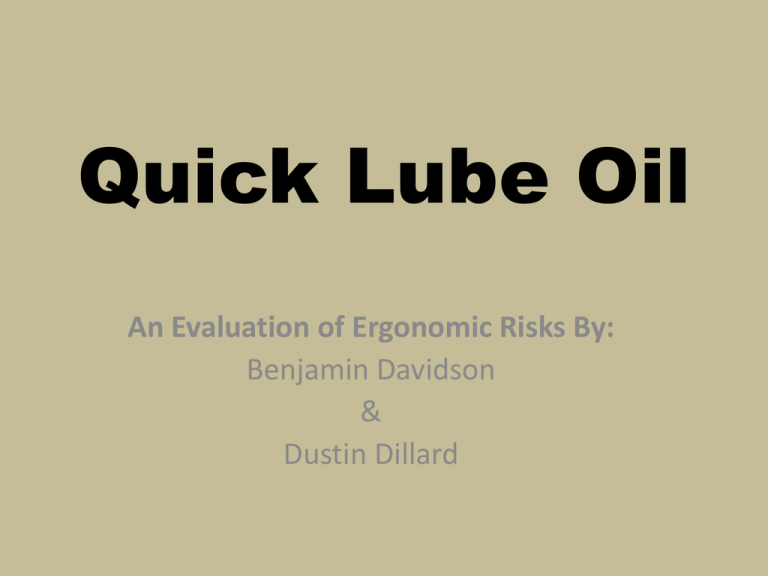
Quick Lube Oil An Evaluation of Ergonomic Risks By: Benjamin Davidson & Dustin Dillard Quick Lube Oil • Full-service, 15-point Oil & Filter Change Includes: • Chassis lubrication • Check/fill transmission fluid, windshield-washer fluid, coolant, power steering fluid, and battery fluid • Inspect differential, tires, air filter, emission breather, PCV valve, and brake fluid • Vacuum interior, check wiper blades, wash windows, oil hinges, check hoses, check belts, check inspection stickers. Exterior Window Cleaning Description: Rinse and squeegee of all exterior windows, front and rear windshields, etc. Evaluation: Vehicles vary in size, some larger and harder to access than others. Rear and front windshields create the most stress on the body because of location. Risk Factors: Repetitive motion in an awkward position in wrist, shoulders and lower back, overreaching, awkward placement of weight on back. Solutions: Step ladders help reduce stress put on the back when an object is held our in front of you. Also holding onto a shorter squeegee will put less stress on the wrist. Oil Level Check Description: removing stick measurer, whipping, and replacing to remove once more to read accurate level of oil. Evaluation: Placement of measuring stick varies from vehicle to vehicle, trucks and SUVs are harder to reach because they are at a higher level, however cars require more bending over. Risk Factors: Repetitive motion in an awkward position, burns from hot oil, possible carpal tunnel from twisting wrist to remove measuring stick, awkward shift of weight on lower back. Solutions: Working at an easier side of the car will help. For taller vehicles a step ladder will allow you to have more space to work. Putting a mat or something down on the car will prevent burns on the employee. Tire Pressure Description: Remove valve stem cover, places pressure gauge on valve stem, inflate or deflate as per manufacturer requirements. Evaluation: Valve stem location may vary though it is most commonly found on the outer face, but can be found on the inner side. Rim styles very which can create difficult access. Risk Factors: Repetitive motion in an awkward kneeling position, awkward placement of weight on knees, excessively arching back, stressful on feet and muscles in legs from unnatural weight baring. Solutions: Since there is stress put on the knees and lower back, a small stool or chair to sit will allow the individual to rest their back not causing as much fatigue. Oil Drain/ Filter Change Description: Remove oil drain plug and drain oil into drain pan and remove oil filter, and replace. As well as lubricate all grease fitting. All done from a confined space below the vehicle. Evaluation: The location of oil filters and grease fittings vary depending on the vehicle. Work surface is overhead and difficult to reach, walking surface is potentially slick. Risk Factors: Repetitive awkward motion in upper extremities such as shoulders and wrists, unnatural motion in neck and positioning. Possible burns resulting from contact with extremely hot oil. Solutions: Wear gloves to prevent burns and unnecessary hazardous materials on the skin. Static posture, having some rest intervals will keep oxygen in the upper extremities. Oil Fill Description: Remove oil cap, bring oil supply hose from reel location, insert in oil fill and grasp activation handle. Remove and replace. Evaluation: Awkward head position because of varies hood types and levels. Different location of filling port causes awkward placement of arms and wrists while grasping. Risk Factors: Repetitive motion in an awkward position, overreaching, awkward placement of weight on back. Possible carpal tunnel from grasping of trigger mechanism. Solutions: Having rest intervals when performing static positions will allow oxygen to get to those overused muscles. Recommendations 1. Static muscle efforts (constrained postures): when muscles is contracted no blood is flowing through the muscle + creates lactic acid buildup + waste products are simply no being removed creating muscular fatigue. • Leads to: a) higher energy consumption b) raised heart rate c) longer rest periods • 15-20% of maximum force will induce painful fatigue if such loads have to be kept up for long periods of time (Nemecek and Grandjean, 1975). • Peak muscular strength: reached from 25-35 years. Most older workers aged between 50 and 60 can only produce 7585% as much muscular strength. Cont. • Try to work as much as possible sitting. • Proper rest intervals will allow recovery from onset muscular fatigue. • Employee diversification • Use a step ladder or chair whenever possible to access a defined area. • Gloves and eyewear are recommended when working around hazardous or hot material. • Lighter tools reduce the stress put on the body, or simply proper instructional use will improve the task. • Try to maintain good posture as much as possible when working and even resting. References • Kroemer, K.H.E. and Grandjean, E. (1997). Fitting the Rask to the Human. Philidelphia: Taylor and Francis, 5th Edition. ISBN:0748406654
